Climate and Senate Races in North Carolina and Georgia
Air Date: Week of October 23, 2020
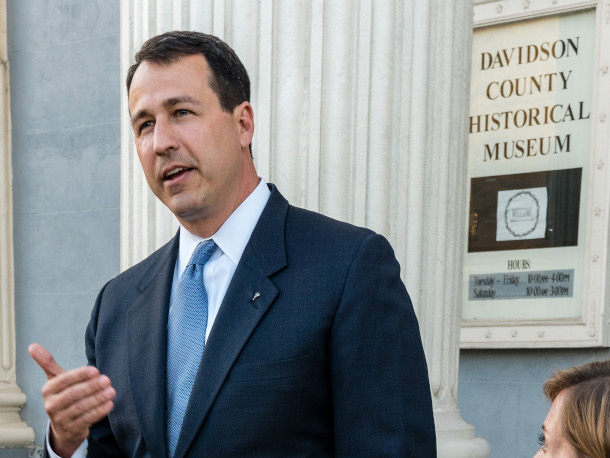
Democrat Cal Cunningham is running for the North Carolina senate seat. Picture by Grayson Barnette. (Photo: Grayson Barnette, Wikimedia, CC BY-SA 4.0)
Since the 1960’s North Carolina and Georgia have favored Republican candidates, but Senate races there this year show a tight race between Republicans and Democrats. More climate awareness and the growing number of young people migrating to these states is changing the electorate there. InsideClimate News Reporter Marianne Lavelle joins Living on Earth’s Bobby Bascomb to look at how climate politics is affecting the North Carolina and the Georgia special election Senate races.
Transcript
BASCOMB: You can see climate now in the senate elections as well this year, in several key races.
CURWOOD: Yeah, Bobby, we’ve covered a lot of these battleground states before and today, you have something for us on North Carolina and the Georgia special election, we already covered the contest between David Perdue and Jon Ossoff.
BASCOMB: Yeah, I talked with Marianne Lavelle, a reporter for Inside Climate News, about these two races in the South, where Democratic candidates are becoming more and more competitive. And once again, there’s increasing focus on climate change and environmental justice. I started by asking Marianne about the Republican incumbent in North Carolina, Senator Thom Tillis, and where he stands on climate change and the environment.
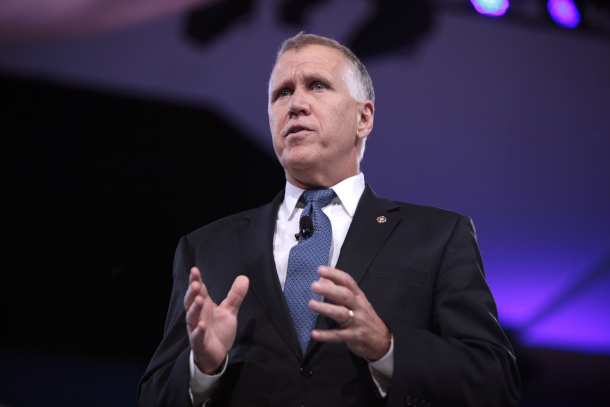
Republican North Carolina Senator Thom Tillis has changed his perspective on climate change since he was elected in 2006. Previously he denied the existence of climate change and was a strong proponent of offshore drilling but recently he has expressed openness to “market-based solutions”. (Photo: Gage Skidmore, Flickr, CC BY ND 2.0)
LAVELLE: Well, Thom Tillis is kind of the example of a Republican who's trying to evolve his position on climate change. When he was first running for senate six years ago, like all of the other Republicans he was running against, absolutely said he just doesn't by that climate change is happening. And very early on, he was really unabashed promoter of fossil fuel development, including drilling offshore of North Carolina. Well, since then, North Carolina has been hit by five hurricanes, which all you know, in various ways have caused a lot of damage in the state. And the coastal counties even though a lot of them are Republican they are not in favor of offshore drilling at all. And it was kind of easy for Thom Tillis to be in favor of offshore drilling six years ago, when President Obama was in it wasn't going to happen but with President Trump he was moving forward on offshore drilling. So fast forward to today, he kind of took credit for the Trump administration's decision just a few weeks ago to say, we're going to back off on offshore drilling for a few states, including North Carolina. And so Thom Tillis is still in line with the republican position on energy. He votes very, very closely in line with President Trump on almost everything, and he has a very low score from the League of Conservation Voters on his Environmental record, but he is talking about himself as someone who cares about climate change. He just doesn't want to hurt the economy.
BASCOMB: Well, let's talk now about his challenger, Democrat Cal Cunningham. He served in the US Army Reserve and as a North Carolina State Senator. And he recently put out a campaign ad that shows North Carolina getting pummeled by hurricanes. And he links that to climate change. Let's have a listen to that ad:
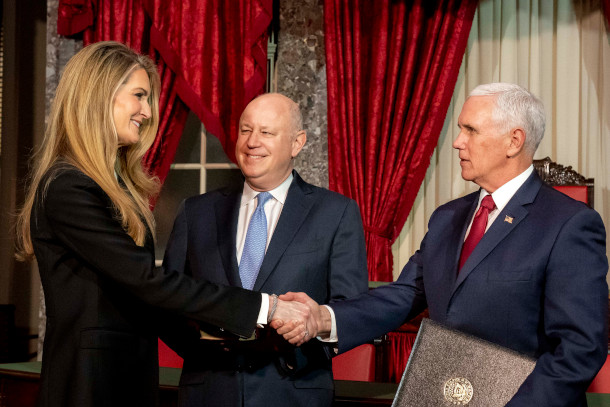
After Republican Senator Johny Isaacson stepped down at the end of 2019, Republican Georgia Governor Brian Kemp appointed Kelly Loeffler as successor. The image above shows Vice President Mike Pence swearing in Kelly Loeffler in January 2020. (Photo: D. Miles Cullen, Public Domain)
CUNNINGHAM: [AMBIENT MUSIC] Taking on climate change is going to be a priority of mine. Because of the impact it's having right here on North Carolina.
VOICES: That is not lightning, those are transformers blowing out. . .
This storm is so immense . . .
CUNNINGHAM: But the size of the storms, we can't deny it. Twice in the last two years, 500 year floods, devastating large portions of our state. [AMBIENT MUSIC]
LAVELLE: What's really interesting about that ad is it's not that common for the candidates themselves to feature climate change in their ads, especially in a very purple state like North Carolina, where the Democrats are trying to appeal to the moderates. They're not just going after progressives. So really to make this strong statement on climate change by Cunningham is a statement of how much traction the issue has in North Carolina. He definitely backed strong environmental legislation when he was in the North Carolina legislature. He also was a business person who worked for a consulting company that helps companies reduce their waste. So that also gives some some green credentials.
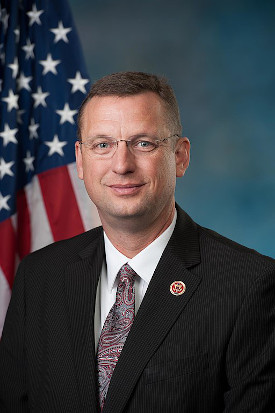
Republican Doug Collins is running for the Georgia Senate seat against 19 other contenders. (Photo: Office of Congressman Doug Collins, Wikimedia Commons, Public Domain)
BASCOMB: Well, let's turn now to Georgia where there are two seats up for grabs. We covered the race between incumbent Senator David Perdue and Jon Ossoff a few weeks ago on the show, but there's also a special election in Georgia to permanently fill the seat of former senator Johnny Isaacson who had to step down last year because of illness. That seat was temporarily filled by Republican Kelly Loeffler. What can you tell us about her environmental record?
LAVELLE: Right? Well, Kelly Loeffler has voted 100% with President Trump. She has a very, very solid record with him. She has voted against things like renewable energy, you almost hear her kind of echoing the rhetoric of the White House on many controversial issues and I would expect her to do the same on climate.
BASCOMB: Well, Senator Loeffler is up against some 20 challengers in this special election. Let's look at just a couple of the front runners starting with Republican Doug Collins. Now both are Republicans, as I said, but how do they compare and contrast on these issues, if at all?
LAVELLE: Well, Doug Collins, again, very, very closely aligned with President Trump. He's very conservative. He doesn't talk about climate change, but you could expect him to be very much in line with the White House on climate change. That has kind of been his pitch. The really interesting person is Reverend Raphael Warnock.
BASCOMB: Hmm. He's the leading Democrat in the race, according to polls, what can you tell us about him?
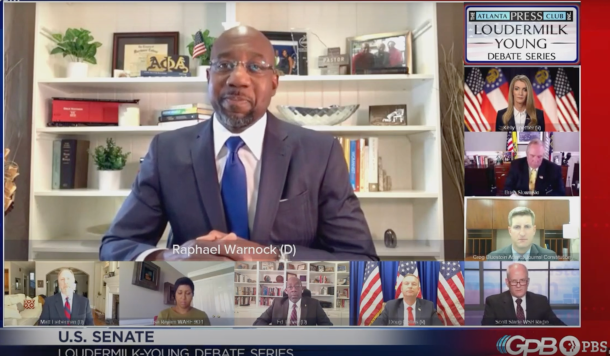
Reverend Raphael Warnock, a Democrat, in a debate against some of the contenders for the Georgia senate seat special election. Starting at the bottom left is Democratic candidate Matt Lieberman, Lisa Rayam of WABE 90.1, Democratic Candidate Ed Tavern (D-GA), Republican candidate Doug Collins, Scott Sade of WSB Radio, Greg Bluestein of the Atlanta Journal Constitution, and Libertarian Party Candidate Brian Slowinski. (Photo: Screenshot of the Georgia Senate Debate hosted by The Atlanta Press Club)
LAVELLE: Right, and the interesting thing is that he's been just slightly in the lead in that race ahead of everyone. And he is a pastor. He has been pastor of Martin Luther King's church, the Ebenezer Baptist Church, in Atlanta, and he has really made environmental justice, his top issue. He's has worked on interfaith meetings on environmental justice, even before running for Senate, he brought Al Gore inn to talk to folks in his church, he has really tried to energize folks in the church to work on climate and environmental justice issues, he really tries to stress the connection between the environment and poverty.
BASCOMB: Well, both North Carolina and Georgia are historically red states that are starting to turn blue or at least a shade of purple. Generally, how would you say that climate change and the environment play into that shifting political orientation?
LAVELLE: I think one of the things that you're seeing in both of these states is there is a lot of migration of young people to the States. And it's not that the young people moving in are like really radical progressives. But it's just not acceptable for these new immigrants to North Carolina, and to Georgia, it's not acceptable to deny climate change. That seems like really backwards, and I think they don't want to tear down the economy, but they want to build it up and they see a pro climate action as the, you know, pro economic growth sort of approach and I think you're seeing that in both Georgia and North Carolina.
BASCOMB: Marianne Lavelle is a reporter for InsideClimate News. Marianne, thanks for taking this time with me today.
LAVELLE: Glad to be here.
Links
Learn more about the North Carolina senate race
Living on Earth wants to hear from you!
Living on Earth
62 Calef Highway, Suite 212
Lee, NH 03861
Telephone: 617-287-4121
E-mail: comments@loe.org
Newsletter [Click here]
Donate to Living on Earth!
Living on Earth is an independent media program and relies entirely on contributions from listeners and institutions supporting public service. Please donate now to preserve an independent environmental voice.
NewsletterLiving on Earth offers a weekly delivery of the show's rundown to your mailbox. Sign up for our newsletter today!
 Sailors For The Sea: Be the change you want to sea.
Sailors For The Sea: Be the change you want to sea.
 The Grantham Foundation for the Protection of the Environment: Committed to protecting and improving the health of the global environment.
The Grantham Foundation for the Protection of the Environment: Committed to protecting and improving the health of the global environment.
 Contribute to Living on Earth and receive, as our gift to you, an archival print of one of Mark Seth Lender's extraordinary wildlife photographs. Follow the link to see Mark's current collection of photographs.
Contribute to Living on Earth and receive, as our gift to you, an archival print of one of Mark Seth Lender's extraordinary wildlife photographs. Follow the link to see Mark's current collection of photographs.
 Buy a signed copy of Mark Seth Lender's book Smeagull the Seagull & support Living on Earth
Buy a signed copy of Mark Seth Lender's book Smeagull the Seagull & support Living on Earth

